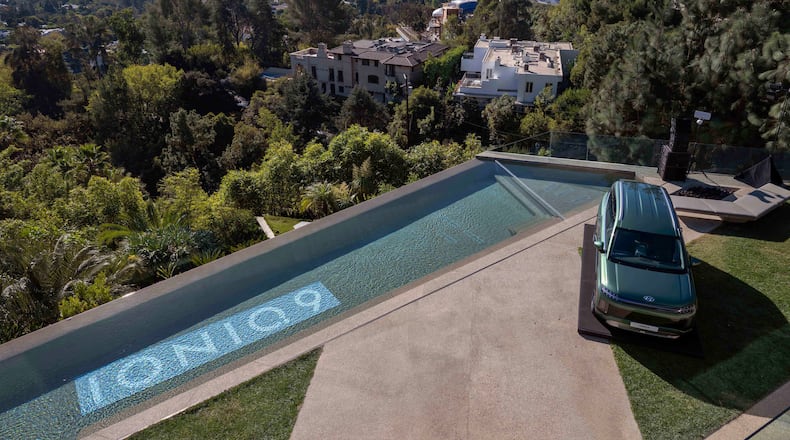LOS ANGELES — It was a reveal with the grandiosity of a golden-age Hollywood premiere.
With Beverly Hills as its backdrop Wednesday, Hyundai Motor Group unveiled its IONIQ 9 electric three-row SUV, which is set to be manufactured at the company’s new Georgia factory. Company leaders from South Korea and America, along with hundreds of car enthusiasts, sipped soju cocktails and snacked on soy-braised black cod while basking at the EV as it glistened in the Southern California sunset.
The event was hosted at the ritzy Sheats-Goldstein Residence, a 1960s architectural landmark known for its starring roles on the silver screen — including in “The Big Lebowski.”
Credit: Courtesy Jeff Green/LACMA
Credit: Courtesy Jeff Green/LACMA
The sprawling estate, with its stark concrete melding with the lush greenery of the Hollywood Hills, was a striking location to unveil an electric SUV that Hyundai is counting on to help Americans move beyond fossil fuels.
“IONIQ 9 is exactly what three-row SUV buyers are looking for. It just happens to be electric,” said José Muñoz, Hyundai North America’s chief executive. In January, he’ll be the new president and CEO of Hyundai Motor Co., which encompasses the Hyundai and Genesis brands.
The auto industry has reached a crossroads in its effort to leave climate-warming fossil fuels in the dust.
New EV sales have continued to increase in the U.S., although not at the pace industry experts predicted. Automakers insist electric is the future, with consumer hesitancy being something that can be overcome.
Consumers consistently cite range anxiety, high sticker prices and lagging charging infrastructure for their hesitance. It’s led some legacy automakers to delay their electrification plans, while multiple, hyped EV startups have struggled to grow into profitable companies.
The EV industry also is poised to undergo federal policy whiplash with President-elect Donald Trump promising to strip away government incentives and consumer tax credits, to the glee of the petroleum sector. Kevin Ketels, an assistant professor of global supply chain management at Wayne State University in Detroit, said all those factors present automakers with an uphill challenge, especially as much of the rest of the developed world embraces EVs.
“You’re running an automobile business, it’s based on the internal combustion engine, and we’re having to switch it over to electric vehicles all while trying to maintain a profitable company,” Ketels said. “It makes it a challenge for our domestic automakers to compete.”
The leaders of Hyundai Motor Group, the world’s third-largest auto manufacturer by volume, say they have the expertise, innovation and scale to overcome those challenges — and rival plug-in pioneer Tesla — for control of the EV market.
And if the company’s efforts pay off, Georgia is poised to be the epicenter of that revolution.
‘The right choice’
Beneath a sunroof in the Sheats-Goldstein Residence was a model of the IONIC 9 manufacturing floor.
Credit: Courtesy Hyundai Motor Group
Credit: Courtesy Hyundai Motor Group
The real thing is nearly 2,500 miles to the east, not far from Savannah.
That’s where Hyundai last month opened its $7.6 billion Metaplant and is coalescing its EV manufacturing efforts for the North American market.
“We are planting roots in Georgia,” Muñoz said. Early next year, IONIQ 9s will start rolling off the Metaplant’s production lines.
Announced in April 2022, the nearly 3,000-acre site along I-16 is expected to someday employ 8,100 people and produce up to 300,000 vehicles a year. The IONIC 9 and its smaller sibling, the IONIC 5 crossover, are the first two models announced.
Credit: Courtesy Hyundai Motor Group Metaplant America
Credit: Courtesy Hyundai Motor Group Metaplant America
For Trip Tollison, the Savannah area’s chief economic development official, who helped recruit Hyundai, it’s a sign the automaker is a worthy corporate partner that will keep its promises to coastal Georgia.
“This underscores the fact that we, on both sides, married a fantastic partner,” Tollison said. “It underscores the wisdom of (Hyundai’s) investment and proves the point that we made the right choice.”
When combined, Hyundai and Kia have the second-largest EV market share, behind Tesla. Hyundai’s EV sales have increased year-over-year by 26%, while its hybrid fleet has enjoyed 37% sales growth during that time.
In addition to Hyundai’s Metaplant, its sister automaker Kia operates a factory in West Point that produces both gas-powered and plug-in vehicles. Kia announced at the L.A. Auto Show that its 2025 electric EV6 crossover will be built in Georgia.
No concessions
Olabisi Boyle, senior vice president of product planning and mobility strategy for Hyundai Motor North America, said the IONIQ 9 and the automaker’s other EVs are designed to tempt hybrid and gas-guzzler buyers to make the switch.
“IONIQ 9 isn’t just an EV. It’s a statement of where smart mobility is heading,” she said. “Importantly, though, it’s not one that asks you to make concessions because it’s electric.”
The IONIQ 9’s frame is reminiscent of a ship’s bow, except it’s designed to cut through air rather than waves. Efficiency is paramount for EVs, increasing their range per charge and reducing concerns over frequent plug-ins for prospective buyers — a common concern among hesitant buyers. Every version of the IONIQ 9 is estimated to get more than 300 miles per charge.
By 2030, Hyundai aims to offer 21 electric models and 14 hybrids. Any of those vehicles eventually could be built in Georgia. Hyundai recently asked state environmental regulators to amend permits to allow for gasoline storage and fuel filling equipment at the Metaplant.
Hyundai officials also have said they’ve made progress developing hydrogen-powered vehicles, recently unveiling a hydrogen fuel cell electric vehicle concept called initium.
Credit: Courtesy Hyundai Motor Group
Credit: Courtesy Hyundai Motor Group
“We believe the future is electric, but we know the road to getting there isn’t just powered by one fuel,” Muñoz said.
— Staff writer Adam Van Brimmer contributed to this report.
About the Author
Keep Reading
The Latest
Featured






